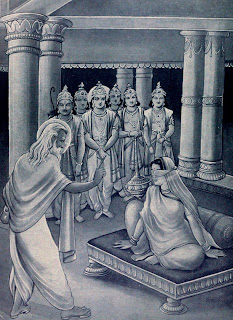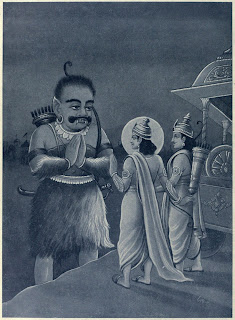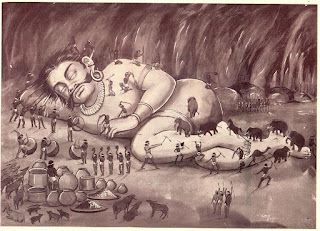Week 9: A mother's Grief
Image Details: Gandhari, Source: Wikimedia
It was a cold, bleak day. The cold air seeped into
my lungs and I could see my breath linger in the air as I walked through the
forest. I could hear the grass crunch underneath my feet and the chirp of the birds
echo through the thin air. “Where is he?”
The thought echoed through my mind and was driving
me crazy. I knew that they were on the battlefield and I could image the tragedies occurring. Then, I heard the sound of a cannon and my
heartbeat quickened. Terrible thoughts began to pour through my mind. “He’s dead! No, no he’s not. He’s smart and
strong. He can protect himself.”
Tears began to fall off of my cheeks as my pace
became faster. As I gazed ahead, I saw the edge of the battlefield. My feet
broke out into a run as I ran towards the field. The wind struck my face and I
could feel the edge of my sari pull me back as if it didn’t want me to see the devastation
up ahead. It wasn’t traditional for women to visit the battlefield, but
tradition could not stop an anxious mother. “He’ll
be alright. He has to be.”
Once I reached the field, I instantly regretted my
decision. The color red was painted across the field. The stench of blood
filled into my nostrils and made me instantly gag. I grabbed the edge of my
sari, covered my nose, and walked into the ground. I gazed across the field and
saw absolute destruction. Chariots were toppled over, although the horses were nowhere
to be seen. They were either killed or escaped during the battle. There were
bodies piled upon bodies, which made it difficult for me to walk. The edge of
my sari was caught on something and I turned around to pull it. It was caught
on one of the belts of a dead soldier. As I grabbed it, I saw that the white
fabric was saturated with the bright red color of blood.
As I roamed through the field, the small glimmer of
hope inside of me began to extinguish. Then, out of the corner of my eye I saw
and sprinted towards the chariot. My shoes had soaked up the blood across the
field and I slipped, grabbing the edge of the chariot wheel.
I pushed back the curls that had encroached upon his
forehead. The agony that filled inside of me finally reached its point and I
let out a scream. I noticed a change inside of me; the
grief that had filled my heart started to convert in to rage. “I’ll make them pay. I swear if it’s the
last thing that I do, I’ll make them pay for what they did.”
Author’s Note: For my story, I used the story of
Gandhari. I felt that she was an underrated character in the Mahabharata and I
wanted to develop a story based on her grief. In the Mahabharata, Gandhari
loses all of her children. However, when she realizes that Duryodhana is dead,
she is unable to process her grief and curses Krishna for the death of her son.
In my story, I detailed Gandhari’s grief over the loss of her son, Duryodhana,
and how her grief transitions into rage. Also, I made her character be able to
see all the atrocities that occurred during the battle rather than having her
blindfolded. I felt that if she was able to see the destruction around her, her
rage would be heightened and more powerful.
Bibliography: Gandhari- A mother blinded by love, Amar Chitra Katha, Vol 644.




Hmmm........
ReplyDeleteThese comments are always difficult, because I don't really know what to optimize for. If I had to say however, it seems that you want to optimize for empathy with Gandhari. It seems that your main technique for this is to describe her grief from a first person point of view. Your secondary method is to describe he thoughts directly. Your third technique is to describe exactly what she's lost. This is a decent list, but for a story of this length, its a bit repetitive. Perhaps you should introduce another strategy, such as recalling their goodbye or you should shorten the story.
Also, there are some minor mechanical problems. Some of the sentences seem to be third person. Also, try varying your sentence types.
Rachana
ReplyDeleteI agree with you, Gandhari is definitely a background character that seems to deserve a little bit more exposure. The fact that I wasn't really sure where this story was coming from should speak enough on how forgotten Gandhari is. Even though it was graphic, I really liked the imagery of the battlefield. I am excited to see where Gandhari goes after this and how she punishes Krishna.
Rachana,
ReplyDeleteI enjoyed your story a lot, and I think you were able to capture the grief really well. If you’ve never experienced this grief, I am impressed you were able to convey it so realistically. I think it humanized the family that everyone seemed to hate so much because it showed they have feelings too. I would love to see what happens next in her point of view since she is most likely the most angry character.
Hey Rachana,
ReplyDeleteI enjoyed this story a lot. I felt the grief through your writing. I thought the use of dialog was nice. It helped with expressing the tone of your story. Also, I enjoyed your verbiage, "I pushed back the curls that had encroached upon his forehead". I'm glad I got to read your work.
Hi Rachana! Wow! What an amazing story. If felt all the greif that Gandhari felt. I also agree with Jasmine's comment, this kind of greif is difficult to capture in writing and even on television (unless the actor/actress is phenomenal). I like how you put this story in Gandhari's perspective since she wasn't talked about much! Great job!
ReplyDelete